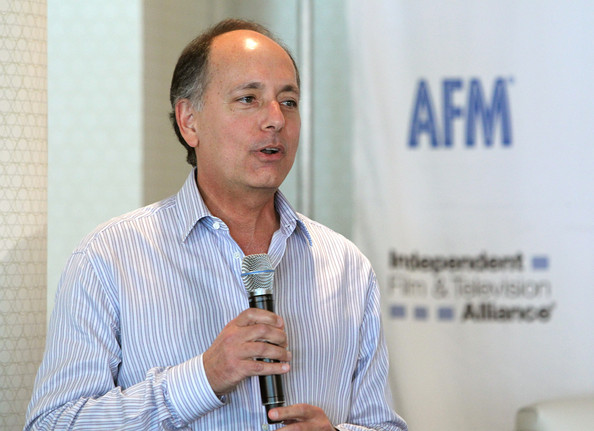|
|
|||||||||||||||||||||||||||||
|
Pro Tools
FILMFESTIVALS | 24/7 world wide coverageWelcome ! Enjoy the best of both worlds: Film & Festival News, exploring the best of the film festivals community. Launched in 1995, relentlessly connecting films to festivals, documenting and promoting festivals worldwide. We are sorry for this ongoing disruption. We are working on it. Please Do Not Publish until this message disappears. For collaboration, editorial contributions, or publicity, please send us an email here. User login |
American Film Market DailiesFilmfestivals.com will be covering AFM 2023 running November 31 October - 5 November, 2023 Contact us for advertising options Every Fall, the Global Film Industry Converges in Santa Monica: Filmmakers, producers, directors and writers from around the world come to AFM to gain exposure, discover new projects and make deals. The American Film Market & Conferences is the largest motion picture trade fair in the world. 2024: November 5 – 10 Circulation of our newsletter 165 000 subscribers I Facebook AFM Photo Gallery I Twitter I Youtube videos Our AFM Newsletters run each day with a bumper pre roll editions and a wrap edition:
 Interview with AFM Managing Director Jonathan Wolf @ 2016 AFM
IFTA’s Executive Vice President and Managing Partner of the AFM since 1998, Jonathan Wolf deems the AFM as the global film world coming to its Hollywood Mecca. A graduate of the University of Southern California Business School, Wolf's extensive professional background, previous to his pivotal roles with IFTA and AFM, includes film distribution as well as finance as CFO of New World International in international operations. The AFM acts as a six month Fall bookend market to the Springtime Cannes market and proves a mainstay crucial event for the buying and selling of international films. I interviewed Wolf during the 2016 AFM as a followup to our Cannes interview six months before. Here is what he had to say:
Were there any new events taking place this year? WOLF: We always tweak our conferences. I think that's important. Adding some sessions, bringing in new speakers. The theaters are new. We're the only market now only screening films in commercial cinemas. We have 29 cinemas. We used to make up temporary screens just to make up for all the need but now with 29 cinemas, everyone's able to screen whatever time they want all the time. We have more commercial cinemas than Cannes and Berlin, making it very easy for the sellers to be able to present their films how they want to show them. Was this year a strong market? WOLF: I read the 1982, '83, '84 trades for the AFM and all of them say, “AFM is a little quieter than last year.” Every single one. One of the reasons is this- if you look at any other industry, the sellers in that industry can sell to any buyer. If you're in the garment industry selling sweaters, you can sell sweaters to Macy's and Bloomingdales. When you sell film you sell it exclusively. If you sell to a buyer in Japan, that buyer has all the rights for Japan forever. So because it's exclusive, the rights are always negotiable and because of that, the buyers don't show their excitement. If a retailer sees something on the shelf they want to buy to put in their store they can say, “this is a great sweater. I can't wait to stock 1,000 of them,” but that's not going to change the price. If they hear about a package from a film company and say, “This is a great package, let's tell all the media. I can't wait to make an offer!” Are you kidding? The price just up because they're all negotiable, not fixed. So the buyers will always say, “Meh, not so much, don't see much.” They can't tell you they've found great film because that drives the prices up. We have 35 years of the AFM and the stories written by everyone is “It's a slow market, can't find any film.” Those who are doing the most business are the hardest to reach. This is a competitive industry, like any sport. There are winners and losers, there are people who hit the bulls eye in terms of anticipating what the market wanted at whatever budget, and there are some that miss, just like in sport. That's why you see such volatility with some coming into the industry and some going out. So slow, no. The buyers are talking about the market being 2% above last year. We have about 7% less sellers the the ratio of buyers and sellers is an improvement. Do you think there is now more quality and less noise in the market? WOLF: The 'less noise' comment is good, yes. The public has become more discerning over time and probably the increase in quality in TV is driving them. So if you're getting such great quality in TV you're not going to step down for feature film. You should be stepping up. The budgets are bifurcating, getting either much bigger or much smaller. There's still a huge business of films made for a million dollars or less because if you could make three films a year for $500K and sell each one for $800K, you have a business. So there are producers and distributors who understand where the market place is and how to get get value out of it, the same way you have companies in real estate- some build big mansions and some build very small one bedroom condominiums. They know where the market place is and they also know how to manufacture in an efficient way. The contractor that makes three million dollar house wouldn't know how to make a hundred thousand dollar condominium. Were there less conferences this year? WOLF: No, we have the same number of sessions. We have six conferences, each are a half day long, and we half six round tables. Our conferences we announce the topics and descriptions end of May so they're known well in advance and they're a curated organized set of education and information. The round tables sometimes come up at the last minute on narrower topics- we're doing one on documentary, LGBT filmmaking, working with low budgets and other intimate discussions. The conferences are in a big room and the topics have been determined five months in advance. The round tables have about 100 attending and the conferences maybe 700. I speak to a number of producers who think they can bypass a sales agent. What can you say to that? WOLF: My goodness! Not having a sales agent means they are going to have to sell their film country by country, media by media. Many of these producers will call or write us asking for a price sheet, wanting to know what their film would sell for in each country. They think it's a menu but that doesn't exist. We get a few producers who want to take their own office to sell their film here. I will personally call them and encourage them not to because it's a fools errand, and I explain to them why. First, are you an expert? Do you know what your film is worth in transactional VOD in Argentina? Do you know what the blue-ray rights are for your film in Germany? When someone says they want French speaking world, do they get Quebec? Do they get the DOM-TOM in North Africa? What is a AVOD? Second, when a buyer buys a film they can't buy one everything. Whatever their pipeline, they can only buy a certain amount. So when they make a commitment to something, and commitment being that it isn't about what you're going towards, it's about what you're willing to give up. So if you have 24 slots for distributing a film as a distributor, you're only going to buy 24. If you pick that film, you've given up one of your slots. So when a buyer comes along they're not just looking at a producer who doesn't know anything thinking they can steal the film from them and buy it for half of what it should go for, they're also looking at whether the producer knows how to affect the full global delivery- Do they have the right art work? Do they have the right marketing materials? Will the stars be presented right in the photos? There's huge complexities in the international delivery and the timing of that delivery. You almost have to go out globally within a few months. Most of the buyers just look at this and say, “Poor producer. Even if I give him one of my slots, I'm taking too much of a risk that I won't get all of the elements (marketing, contractual, rights) and everything that's necessary. What is your view on the importance of film festivals? WOLF: I'm not a fan of festivals on this level. If you have a finished film and you've had no pre-sales or anything, and you want to decide what to do with it, the first thing any producer should do is reach the distributors. Have acquisition screenings, bicycle DCPs to their theaters and screening rooms, whatever it takes. They need to exhaust the avenues of putting their film in front of distribution executives before going to a festival. Why? If you go to a festival first, you've lost control of the film. You don't control what day it plays, what time, or who is in the audience. Second, the film will be reviewed. The decision of when to have a film reviewed is a strategic decision based on the knowledge of competent marketers about who will review it and when. You could have a Sci-Fi movie that's not so interesting but if you put six Sci-Fi reviewers who love Sci-Fi movies and write blogs, then you control your reviews. If you think you're going to impress a distributor by a film festival award, that's a crutch. A sales agent doesn't need that and can sell it on their own. What makes AFM different than the other major markets (Cannes and Berlin) and why is it so strategic and important for buyers and sellers? WOLF: We're very similar to Cannes in that it's the same sellers and buyers in both markets. There may be a touch more American here and a touch more European at Cannes because of the geography but it's essentially the same. They're book ends on the calendar, six months apart. From Cannes to AFM, there is a huge buildup in projects and films and the world is ready to get together. Cannes is attached to the biggest and most prestigious festival in the world and nobody misses their chance to spend a week on the Croisette. AFM is in Hollywood and the annual trip is to Mecca, if you will. When people decide to go to any trade fair in any industry and they're looking for their return of investment for going, it isn't just the credential, it's the travel and all the other expenses. The value of coming to AFM is high because we're in Hollywood where the studios, talent agencies, financiers. Half of our buyers and sellers have meetings in Hollywood so it becomes Hollywood in the Fall and Cannes in the Spring. Berlin is a mid semester stop. You're conspicuous if you're absent at AFM and Cannes. Not so much in Berlin; we see maybe 70% participation at that level. AFM and Cannes are at equal value. Berlin a little less, and that's with respect to my colleagues in Berlin. The industry has to be at both but the production community picks and chooses what's best for them.
28.11.2016 | American Film Market Dailies's blog Cat. : Interview with AFM Managing Director Jonathan Wolf @ 2016 AFM Interviews
|
LinksThe Bulletin Board > The Bulletin Board Blog Following News Interview with EFM (Berlin) Director
Interview with IFTA Chairman (AFM)
Interview with Cannes Marche du Film Director
Filmfestivals.com dailies live coverage from > Live from India
Useful links for the indies: > Big files transfer
+ SUBSCRIBE to the weekly Newsletter DealsUser imagesAbout American Film Market Dailies Prewitt Jean Prewitt Jean (IFTA) The AFM is not a festival - it is the largest motion picture market in the world. 8,000 industry attendees, including producers, distributors, directors, agents, writers, lawyers & bankers. Over 540 films screened, most world or U.S. premieres.
$US3 Billion spent annually by participants to produce films
8,000+ industry professionals
2,000+ new films and projects
1,000+ production companies
400+ distributors
540+ films screened
100+ world premiers
70+ countries represented
50+ thought leaders speaking
7 days of networking activities
1 beachfront campus that covers it all
Our AFM Newsletters run each day with three bumper pre roll editions and a wrap edition: 2018 FULL HIT STORY TOLD IN 8 EPISODES Pre roll newsletter N° 1 AFM 2017 Wrap & global I N°8 I N°7 I N°6 I N°5 I N°4 I OPENING N°3 I Preview N°2 I N°1 AFM 2016: Pre roll N° 1 I Pre roll N° 2 Opening Newsletter N°3 I N°4 I N°5 I N°6 Focus on ANIMATION I N°7 I Final wrap
View my profile Send me a message My festivalThe EditorUser contributions |
|||||||||||||||||||||||||||





















.jpeg)

.jpg)





